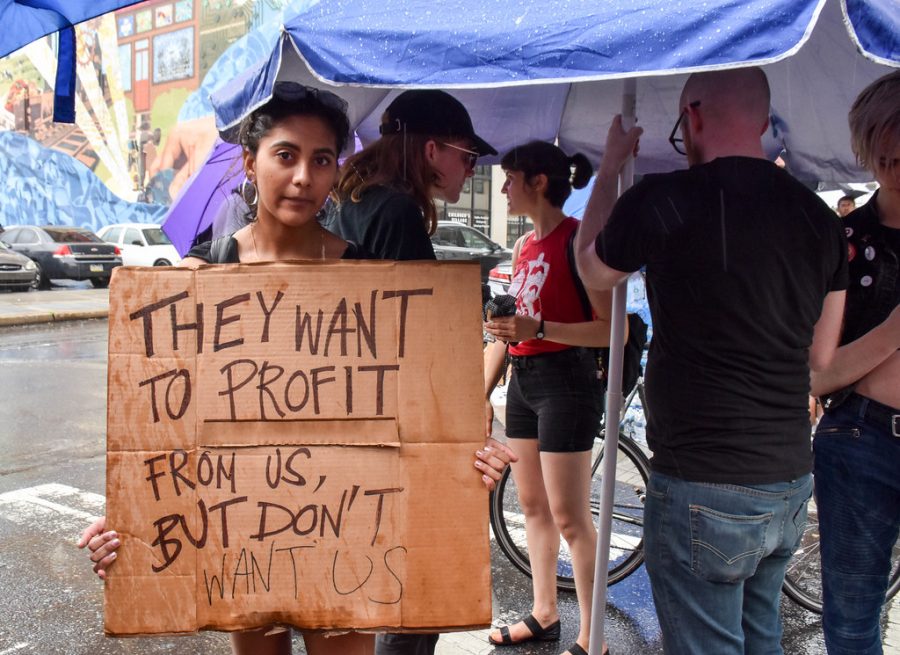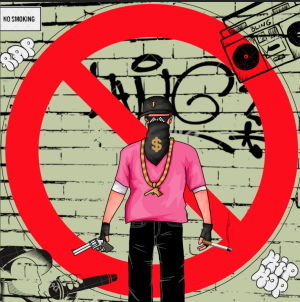Undocumented during a pandemic
A social advocate for immigrant rights protests in favor of everyone’s right to achieve the American dream.
April 27, 2020
During such unprecedented times, we are all fearful, but for the immigrant community, there is a whole new layer of fear created by COVID-19.
Questions no one should be worried about right now are among the most asked by immigrants: Does going to the hospital hurt my chances of becoming a legal resident? Should I seek help if I am undocumented? How will I afford to feed my family and make rent as more people are forced to stay home?
The largest emergency aid deal in U.S. history was passed on Wednesday, March 25 to address the economic fallout of the coronavirus. A single unemployed taxpayer earning up to $75,000 will receive $1,200. Those with children under 17 will receive an additional $500 for each child. Married taxpayers filing jointly and earning up to $150,000 will receive $2,400 and also benefit from the $500 extra for each kid.
It sounds great, right? Until you hear that this $2.2 trillion dollar package has one major exclusion: millions of hard-working tax-paying immigrants who do not have legal status in the U.S.
When stimulus checks start going out across the country in April, undocumented immigrants will not be receiving them. Surprised? Probably not, considering immigrants are usually left out from most federal benefits such as food stamps, subsidized housing, and Medicaid.
But we did expect this to be treated differently, what with COVID-19 devastating global markets, overwhelming hospitals, and millions of people losing their job. Those who do remain employed don’t have the option of working from home and are risking their health to keep supply chains going. Seeing the threat the novel coronavirus poses, the government shouldn’t be treating this like any other deal.
Right now, if someone feels like they can’t go to the hospital or miss a day of work, then our whole community is at risk. Don’t forget, undocumented workers are the ones still in the fields, still in the factories, still the janitors, still looking for work as day laborers. An effective national response to a pandemic would not exclude large segments of the population because not only is it illogical, but immoral.
Senior Karen Alegria, 17, voices her opinion on the governments’ decision to exclude immigrants.
“People who are currently working can apply for hazard pay and although immigrants are also risking their lives they don’t qualify. The money being handed out by the government should be given to anyone who has put in work in this country regardless of their legal status. There are children who are citizens in this country and they have nothing to eat because their parents are immigrants. I find a lot of issues with that. I believe that from all the times people have drawn from their basic human rights this shouldn’t be seen as an option to do once again,” said Alegria.
Immigrants are hardworking people who have repeatedly shown their value to our country. It is sad that even during a pandemic our government fails to realize that. Many immigrants pay taxes, using an Individual Taxpayer Identification Number (ITIN) instead of a Social Security number. The most recent IRS data, from 2015, shows that they received 4.4 million income tax returns from workers who don’t have Social Security numbers, which includes undocumented immigrants. That year alone, they paid $23.6 billion in income taxes. Certainly, our government has no problem accepting the billions of dollars undocumented immigrants contribute in taxes each year. However, if the government continues to strip away their basic human rights, they should stop accepting their money.
Sophomore Rebeca Gonzalez is sad to hear not everyone was included in the stimulus package.
“Hearing that immigrants will not be getting stimulus checks sounds sad in my opinion especially if they are working and actually helping the country. Not only that but it seems unethical to just say ‘these people have families to take care of but they don’t get checks because they are immigrants,” said Gonzalez.
Countless immigrants in our country have admitted to feeling invisible to our government. It almost seems as if they went out of their way to exclude undocumented immigrants. So much so, they excluded even mixed-status families, meaning a family whose members include people with different citizenship or immigration statuses. This leaves millions of families petrified and wondering if they’ll be able to fend for their families. COVID-19 is scary for everyone but this is truly an immigrant family’s worst nightmare.
Junior Alondra Luis worries for an immigrant family’s health.
“Due to their lack of social security, they aren’t able to receive the money but it doesn’t mean they didn’t work as hard as everyone else or didn’t lose their jobs as everyone else did. It’s unfair that some of them, even after they lose their job continue looking for another to keep paying their bills and risk their health and the health of their family,” said Luis.
Immigrants are often employed at places that do not offer paid sick leave or give them the privilege of being able to self-quarantine. This leaves immigrants with a very tough choice: facing exposure or facing homelessness. Immigrants go to work every day with the fear of coming back and giving their family the virus. Especially since a lot of them avoid going to hospitals or asking for help with fear of deportation. But not going to work isn’t an option, considering many immigrant families live paycheck to paycheck and missing one day of work would put their home at risk.
It is time, now more than ever, for our government to realize the contribution immigrants bring to our nation and for them to give them the help they deserve. There are no differences between a family with legal status and one without. All they want is to give their family a good life. Immigrants want to provide food and a home for their families and they want to pay their internet bills so their children can keep learning online. They just want to provide the best life for their children so they can lead a better one in the future. Immigrant parents accept dangerous jobs and deal with their troubles so that one day their kids don’t have to.
“Before the SARS-CoV-2 immigrant workers were taking dangerous jobs as it was their only possible income, and I believe it’s unfair that in the times we are living in they continue to be put in danger,” said Alegria.







































